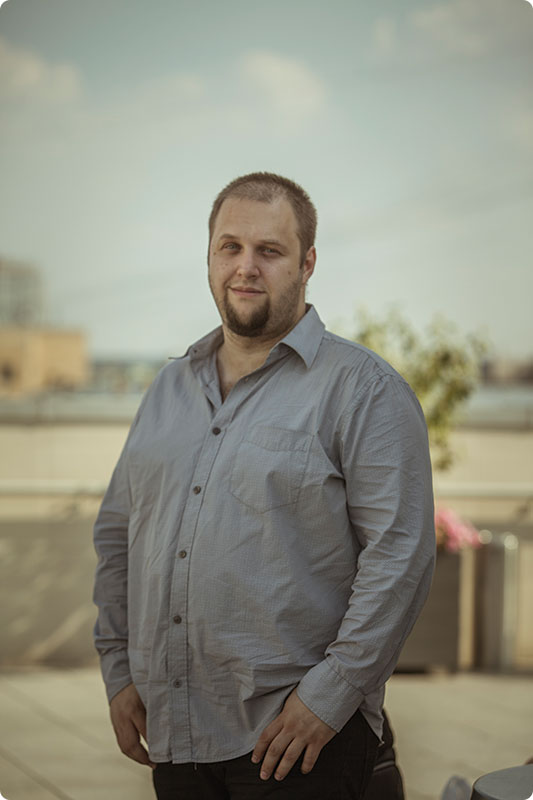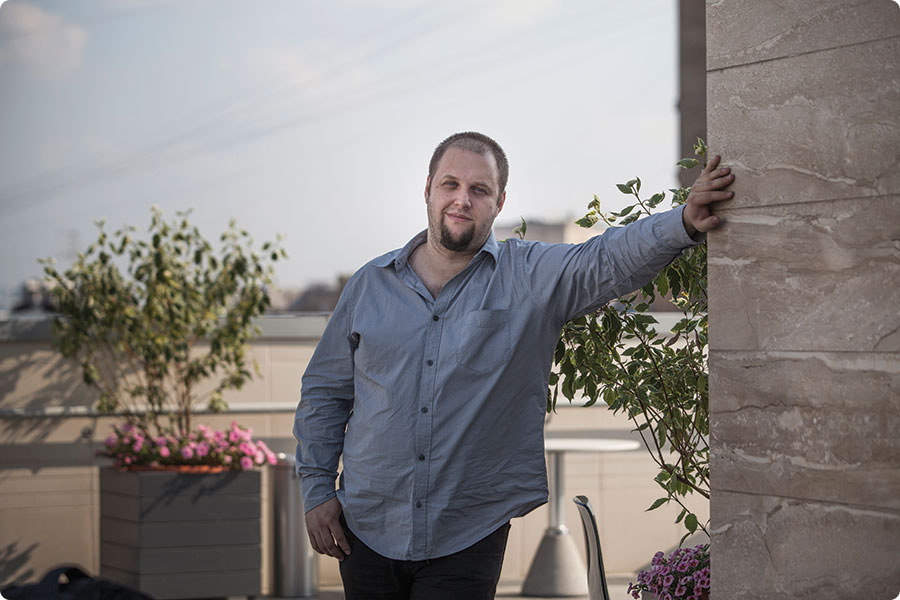Interview with Bobuk aka Grigory Bakunov, director of technology distribution at Yandex and radio host T

Someone Gregory is familiar from the Radio-T podcast, of which he has been a co-author for seven years. Someone he remembered for performances at various tehnotuskah. Someone saw his projects on GitHub. But a blitz survey conducted by the editorial board showed that no one knows what he does in real life. The closest version to the truth was: “Well, probably something like an evangelist.” In fact, everything is more complicated. This is Yandex. And this is Bobuk.
If someone in English asks me what I do, I have a great phrase: I do my best. I do everything I can, do the best I can do. It is true, I do not prevaricate. If I see some part of the work that I can do, and I understand that no one else is up to it now, I take and do.
Yandex is a company where you can work with your hands at any time. When tragedy happened and Ilya Segalovich died, we decided to create a memory site. 5–6 people were involved in this site, including me and one of the leaders of our direction. One hand code, the other did resayzilku pictures. We have literally everything, from cleaners and ending with leaders of large areas, able to work with their hands and love to do it.
')
I usually say that Yandex is bad - you need to work here.
Before Yandex, I worked as a technical director, but I was tired of managing people, and I said: "I want to work with my hands." I was ready to go to Yandex, if they take me just as an admin.
After a short interview I was hired by Yandex. But after a week it became clear that I was “thrown”: here you need to work not only with your hands, but also with your head. Six months later, my subordinates started up again. After another year and a half, I, by an unfortunate coincidence, moved from server management to managing people and development. And so it went - a group, department, direction ... In general, I have a job in Yandex.

My terms of reference are a sad subject. The last couple of years I have been engaged in making life easier for Ilya Segalovich. Just removed from his task. Now Ilya is gone, and a big question has arisen - what to do next? And suddenly it came to the realization that everything must be done so that all those concepts that remained after it would come true. A lot of them. I figured it out ... just for five years we definitely have enough.
Can I go somewhere? This is also a sad story. The fact is that people who have worked in Yandex have simply nowhere else to go in Russia.
Historically
No one understands what “technology distribution director” means. The name was invented when it became necessary to stick me at least some position. It stuck, and I'm not worried.
I am the gateway between Yandex and the outside world. I am trying to pull out the technologies that are created inside the company, and the good tools that are outside, to drag inwards. This is a convenient position. Because I know very well and constantly monitor what is happening in the world. And at the same time I have some authority inside the company and imagine what is happening inside.
In general, keeping track of everything that is being done in Yandex is not easy. Still, the company employs five thousand people.
People involved in a certain technology or direction know about new technologies, but they do not always have time to try everything. Therefore, there is often a situation when someone comes to me and asks: “Have you tried Cassandra? How is she?". And you begin to talk about all the horrors and delights of Cassandra, practically "the brilliance and poverty of open source."
By the way, if a developer likes, say, Cassandra, this does not mean that he will be able to use it in production. An administrator will come and say: “Guys, we have tried this thing many times and, to put it mildly, do not know how to use it, it is not suitable for our work. Let's choose from this or this. ”
On the other hand, you need to be aware of everything that is being done in the world, you need to read and try everything with your hands. Read in order to understand where the market is moving, the Internet, technology. And constantly try something before everyone else to have their own opinion about what it is. Say, reading about Windows Phone and thinking about what is behind it, you can imagine some horrors. But when you touch it with your hands, you understand that everything is not so bad at all.
In addition, you need to pull out new concepts from our developers and people who work with their hands. So, as last year we pulled out the "Islands". You need to bring ideas to the company, and sometimes bring some concepts out.
In the announcements that we do at conferences for developers, a lot of my work. Take at least Yet another Conference (YaC). By the way, this year there will be a separate section on information security.
To be in the subject, I have a self-written tool for reading news. A system that allows you to aggregate 500 news feeds and select from them in a semi-automatic mode what I might be potentially interested in. Something like Prismatic'a, only made long before its appearance.

Traditional news aggregators count conversions and clicks, but I need something else. I often, not yet understanding what this snippet means, follow the link to figure out what it is. For me it is more important how long I stayed on the page, whether I scrolled the first page, scrolling down, and so on.
Search team
The birth of a new project in Yandex is usually tied to agreements. Most often it looks like this: there is a person who is burning with an idea. This person may be a techie, or may even work in support services. He begins to run around the company shouting "Let's do it!".
In the end, he convinces someone, people get together and discuss how to make such a service. After they go to the management of the company, for example to the head of their direction, and they say: "There is such a brilliant thing, let's do it." And there are many parties involved.
There are programmers. They are programming. They most often have a team lead - a person who leads a certain group. As a rule, he also programs. Programmers are divided into server and client parts, as this is a completely different area of expertise.
About admins Yandex you need to understand that our average admin programs better than the average programmer on the market. For a long time, our admins generally wrote absolutely their own OS for use within the company. Therefore, it is easy for programmers to negotiate with admins about how the project will look like from a server point of view.
Terribly I do not like the term "user experience specialist". However, our designers are specialists who understand how the user works with the interface. They draw, design the interface of the future application or site.
There are also guys Anton Karpov (director of Yandex on IB. - Approx. Ed.), They mostly hit the hands of system administrators. They make it so that from the very beginning everything is clear and safe. They ensure that only safe components are used so that everything is tested.
There are testers. Moreover, testers are different, both functional (checking everything for compliance with the stated idea) and load testers, who are so good at checking if the service is not falling under load, which sometimes has to be rewritten.
There is a glue between all the above. This person is called a "project manager." He is a message router, a man with iron legs, who runs in all directions and tells everyone what is happening.
And then there is the product manager. This position can hold any of these people. It determines in which direction the product will develop. He has a vision, he understands the concept as a whole.
Usually the project is fixed inside some direction. For example, there is the direction of search, maps or communication services. And at the top of each project, as a rule, there is a leader of some direction. He directs a little what is happening in the right direction.
And it also happens that a product is made by one person. This happened more than once. In short, Yandex generally has a very flexible distribution of roles.
How it all began
I remember well that I first became interested in computers when I realized that this was something contrary to my parents. My parents always told me that I needed to study law or medicine, and I accidentally saw real computers at my friend's parents at work. The impression, of course, was indescribable. After that, I realized that this is not what my parents want, which means that this is what I need!
Hobby was incredible. I could then see the computer a maximum of once a week, when I went to visit my parents for work. All the rest of the time it took me to purely theoretical studies. There was no internet then.
I still have a notebook, where I wrote programs by hand. I could not check them on real hardware, so I myself performed the functions of a computer, that is, I calculated everything myself. And then at some point I happened to be near the computer, took out a notebook and quickly re-stuffed everything, checked whether everything was in order, made corrections to the code from both sides - in what I typed, and in what I wrote. It was very interesting.
My first job in IT looked like this: I wrote bootloaders. At that moment, Spectrum began to bloom in a violent color, and even worse, the first Spectrum appeared with disk drives. A couple of companies that were then selling discs in Russia began to gradually release their own discs with collections of games. Of course, all this was 100% warez, because then nothing was legally sold.
It was then fashionable to make the bootloader on disks — an assembler program that runs first after you insert the disk. It was at that time that I was engaged in the mass production of these very loaders - beautiful programs, with a running strip, multi-colored backgrounds, all as expected. And the money went from there good. I remember well that on these bootloaders I earned more than my father at the factory.
Afterwards, while working as a programmer, I spent a lot of time going to different countries: I was just interested in traveling. He took short contracts and worked on image recognition for several months, working with sound, digitizing data from satellites - in short, a lot of different interesting and not so much things. I just wanted to travel around the world.
It was fascinating, but sooner or later it had to end. In the end, I first went to study ASPLinux (a subsidiary of SWSoft, which is now called Parallels), then worked for myself for a while, and after the familiar guys invited me to go to Yandex.
I have a non-profile education, I have nothing to do with IT. By and large, I have no “craving for IT”. I was rushing from two things: interesting technology and products that can benefit people.
To benefit people now, IT has to do. Because this is the easiest way to reach some 10-15 million people. After all, Yandex is a big company, there are no services here that are used by less than a million people.
How to get to Yandex?
Getting to work at Yandex is very simple: you need to be a specialist. In any area. Wherever you want to work, you have to be a pro in this area. Until you become one, you are unlikely to get here.
But there are still many different things by which people are eliminated. In addition to professional skills (that is, the programmer must be able to program, know the algorithms), it is also important to do something else. For example, it is very difficult to work with people who absolutely do not know how to communicate.
Someone will now start shouting that the programmer’s task is to write code, not to communicate. But it does not happen. It does not happen that a person does not communicate at all within the team. If this is not the case, most likely, a part of this team does one thing, a part - quite another. Because of this, the whole development process is crumbling.

I often say that a good programmer can write code no more than four hours a day. The rest of the time his brain is already turned off, and he is not able to engage in creative activities. In fact, people who have never programmed and never worked think that four hours is very little. But it is a lot. From my own experience I know that programming four hours a day is a brain explosion. The brain just flows through the ears.
With our job interviews, everything is pretty simple. The interview is divided into several stages, different skills are tested: whether it is the ability to communicate, the ability to work under stress (because any interview is always stressful) or the ability to write code.
There are vacancies where the code is not asked to write, but they are asked to solve some kind of problem. Not in the sense of "how many balls fit on Mount Fuji," but some real logical problem of simple type. If they take the person they want to take as a potential system architect, they propose to design some kind of service. Just take and large blocks, large strokes mark it. So we understand whether a person is suitable for us or not.
Radio T
The podcast audience is already more than on the radio. You know, somehow I ended up on the same radio. I was invited to the morning show and asked: “Well, what are you doing on the Internet?” I told him that we were doing the show and that he had an audience four times more than them. They were so offended: the offense was simply read on the face!
Radio T is a show. With all the consequences. It is often planned. For example, before we begin, we most often agree on who will be “for” and who will be “against” a certain topic. Because if everyone is in favor, it will sound bad.
Sometimes you have to deliberately, having prepared in advance, say nonsense. So that people then get into the Internet and begin to tell how stupid we are. On the one hand, it is hard. You think: “Damn, now everyone will call me a dumbass!” On the other hand, then there is so much joy, because you understand - people do not just write something, they go, get ready, read, tell us what we are all stupid, Feel better and smarter.

Podcasting is difficult to treat as a hobby. I recently sat down and wrote down figures for Radio T for a report and found that this year will be seven years already, as we have been doing. Well, how can seven years engage in the same hobby?
This is not to say that Radio-T is a non-commercial project. We have audio parts, there are custom themes (when people come to us and ask to discuss their topic). But there is an important point: Radio-T is a very tough show. Even if you are a sponsor of a certain topic, this does not mean that we will highlight it positively. The only thing we guarantee is the mention of the topic. Maybe the whole discussion will result in “yes well, some kind of garbage - who came up with it at all?”.
We are recording via Skype. Usually, the entire stream is collected from one of us and is directly transmitted to about fifty broadcast servers. Not many people listen to us online - about two thousand people. Some of these people are chatting and happily writing messages, which is also an incredibly exciting process. There has developed its own small get-together, there are very smart people, there are ... less intelligent.
When we post a new release, a crowd of people rushes to rock it. Directly from our servers downloads about a hundred thousand people. Another thousand two hundred are pumping through various torrents ... In general, we have a fairly large audience, and we built a real national CDN to distribute these files. Therefore, when you come to Radio T to download the next issue, you do not know from whose server you actually download it.
Of course, literally everyone tells us that video is very necessary, but video production is very expensive. Take at least human resources. We need to hire an operator plus a person who will sit “on the air” - an ether operator who will put the necessary pictures while we are talking. And unduly do not want to strain. Everyone has another job, and it’s hard to give all that much in this side project.
This is just a big deal. Everyone pursues something of their own, understandable, and most often achieves this. My goal is to make people concentrated around this show become smarter, more educated and more often pay attention to what is happening. And it seems to me that helps.

First published in the Hacker magazine dated 09/2013.
Publication on Issuu.com
Subscribe to "Hacker"


Source: https://habr.com/ru/post/205832/
All Articles